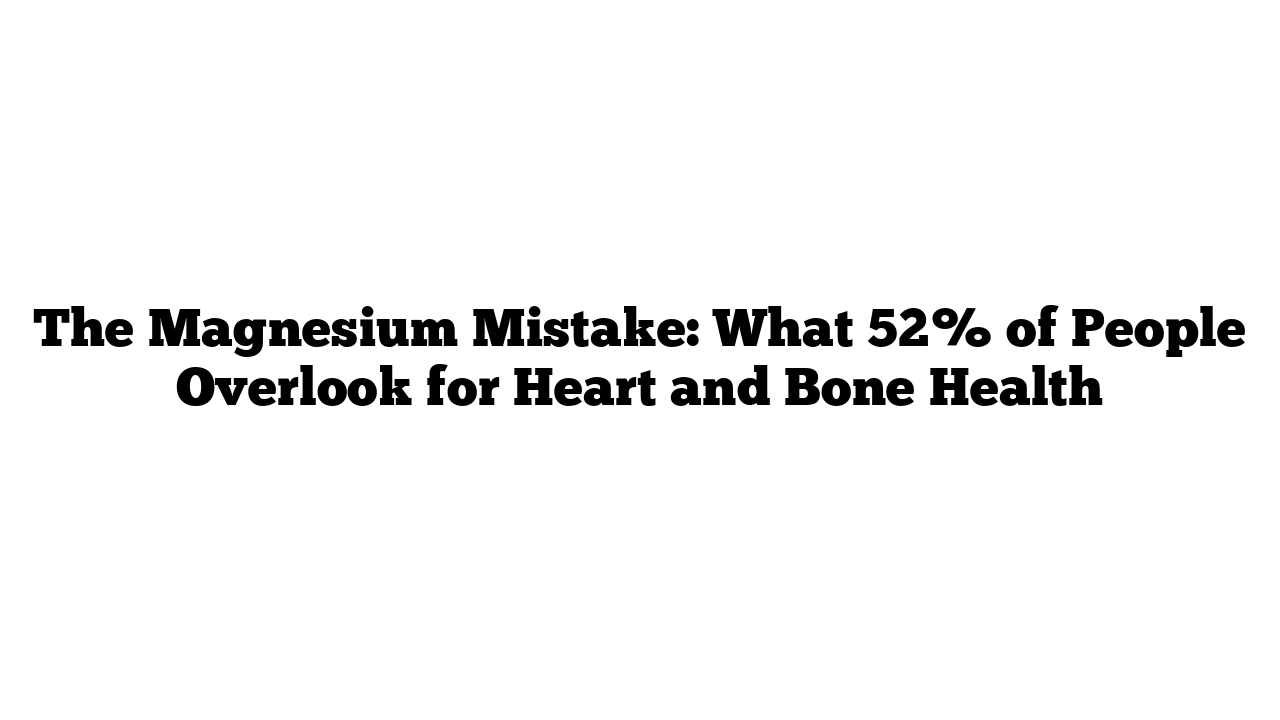Did you know that over half of Americans are unknowingly making a mistake when it comes to their magnesium intake? This often-overlooked mineral is crucial for heart health, bone strength, blood sugar control, and more. However, most people don’t consume enough magnesium, putting them at increased risk for heart disease, strokes, diabetes, and weakened bones.
In this article, we’ll discuss the science behind magnesium’s health benefits, uncover common pitfalls, and discuss how to achieve optimal intake through diet and, if needed, supplementation. Plus, we’ll cover a surprising fact about magnesium that shocked researchers—so let’s get started.
Why Magnesium Matters: Beyond Heart Health
Magnesium is an essential mineral involved in more than 300 enzymatic processes in the body. It plays a critical role in:
- Protein synthesis
- Muscle and nerve function
- Blood sugar control
- Blood pressure regulation
- Bone structure development
Magnesium also supports the transport of calcium and potassium ions across cell membranes, which is vital for nerve impulse conduction and muscle contraction. In short, magnesium is a powerhouse for overall health and particularly beneficial for the heart.
The Hidden Flaw in Magnesium Testing
Even if your blood test shows normal magnesium levels, you could still be deficient. This is because only about 1% of the body’s magnesium is found in blood; the majority is stored in bones and soft tissues. Blood levels are tightly regulated, so a standard test doesn’t reveal your body’s total magnesium reserves.
Alternative Ways to Measure Magnesium
Tests like saliva and urine analysis can provide additional information, but no single test is fully reliable. This testing challenge often leads to the big mistake of underestimating the need for magnesium.
Scientific Evidence: Magnesium and Health Benefits
Many studies support the association between higher magnesium intake and better health outcomes. Here are some striking examples:
- Heart Health: A 2010 study of over 14,000 people found that higher magnesium intake was linked to nearly a 40% reduction in the risk of sudden heart death.
- Heart Disease: A 2013 study in the American Journal of Clinical Nutrition involving 300,000+ people showed that higher magnesium intake was associated with a 30% lower risk of heart disease.
- Stroke: A 2012 study with over 240,000 participants found a strong link between magnesium intake and a lower risk of stroke.
These studies clearly highlight magnesium’s benefits. However, it’s important to note that these results show correlation, not causation—meaning we can’t say for sure that higher magnesium causes these health benefits, only that they’re related.
Magnesium and Metabolic Health
Magnesium has also been associated with a lower risk of developing type 2 diabetes and improved markers of metabolic syndrome (such as blood pressure, cholesterol, and blood sugar levels). A 2011 study involving more than 500,000 people found that higher magnesium intake correlated with a 22% reduced risk of type 2 diabetes.
Yet again, these studies are observational and can’t definitively prove causation. The issue with magnesium studies often boils down to funding: unlike new drugs, there’s less financial incentive to conduct large-scale, long-term studies on simple minerals like magnesium.
How to Achieve Optimal Magnesium Levels: Food vs. Supplements
According to dietary guidelines, adult men should consume 420 mg of magnesium daily, and adult women should aim for 320 mg. Yet, about 48% of Americans fall short of these targets.
Magnesium-Rich Foods to Include in Your Diet
Magnesium can be found in many plant-based foods, such as:
- Leafy green vegetables (e.g., spinach)
- Legumes (e.g., beans and lentils)
- Nuts and seeds
- Whole grains
A diet high in processed foods is often low in magnesium since processing strips away most of the mineral. Instead of relying solely on supplements, focusing on a diet rich in whole foods is ideal.
Choosing the Right Magnesium Supplement (If Needed)
If you decide to use a supplement, it’s essential to pick the right form. Some common options include:
- Magnesium Oxide: Cheap but poorly absorbed.
- Magnesium Citrate: Affordable and well-absorbed, though it may have a mild laxative effect.
- Magnesium Glycinate: Bound to glycine, an amino acid, which enhances absorption and may offer additional calming benefits.
- Magnesium Taurate: Combined with taurine, which supports heart health.
Important Tip: When buying supplements, check the label for the amount of elemental magnesium rather than the compound amount. For example, if your goal is 126 mg of elemental magnesium, you might need over 1,500 mg of magnesium taurate due to its low elemental magnesium content.
Surprising Insight: Magnesium and Water Supply
Here’s an interesting fact that stunned researchers: historically, much of our magnesium came from drinking water. However, with the rise of purified and desalinated water, magnesium levels in our drinking water have dropped significantly. For example:
- A 2017 study from Israel found that switching to desalinated seawater significantly reduced magnesium levels in the population’s drinking water.
- In Denmark, as magnesium levels in the water decreased, rates of heart attacks, strokes, and atrial fibrillation increased.
This shift in water quality may partly explain why magnesium deficiency is now so common.
The Key Takeaway
Magnesium is essential for good health, yet more than half of us fail to meet the recommended intake. This common mistake may contribute to preventable health risks. Focus on a magnesium-rich diet, with supplements as a secondary strategy to fill in any gaps. Remember, supplements are intended to complement a healthy diet, not replace it.
To learn more about how specific magnesium forms can benefit your health, visit medicaltimes.io.
